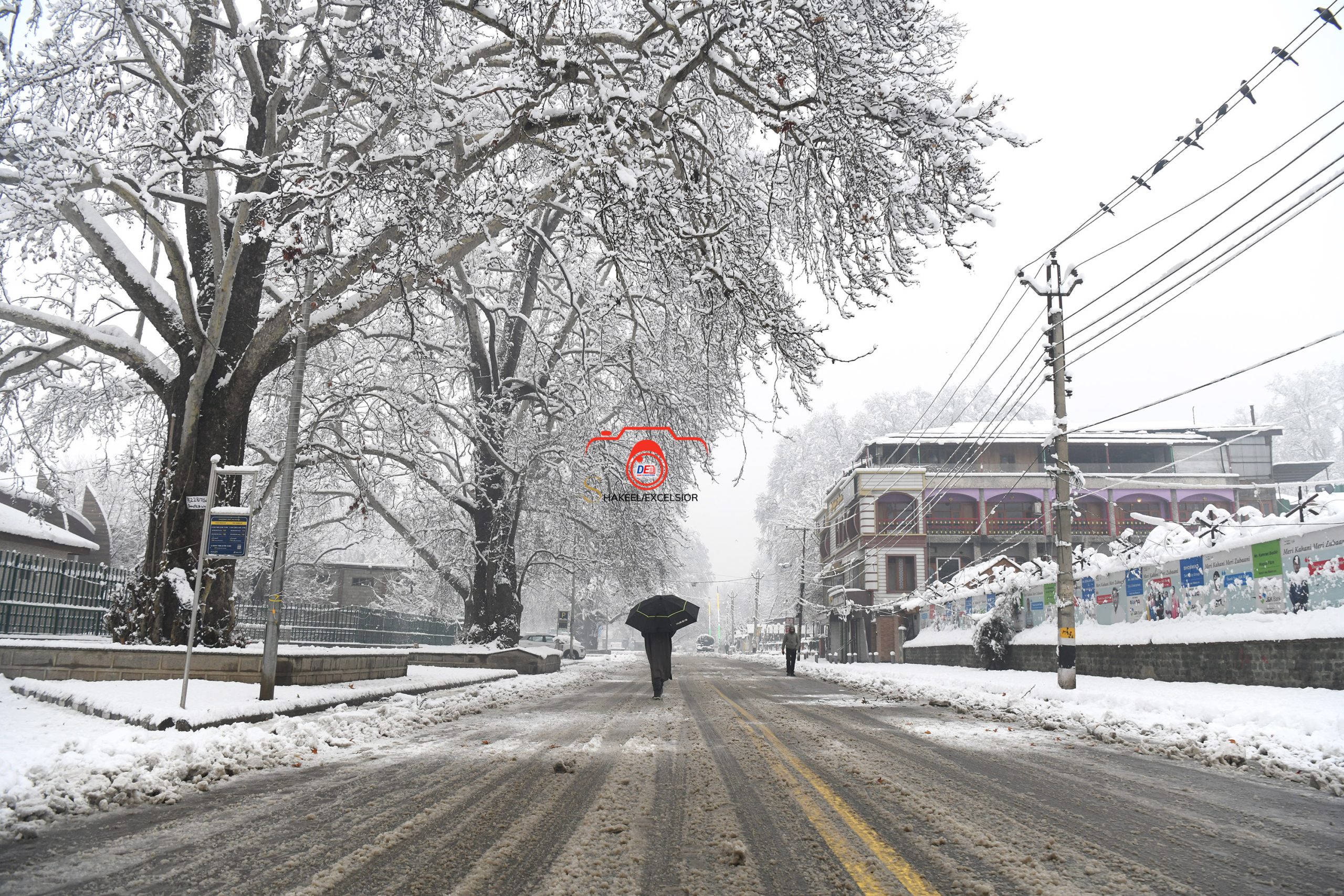Srinagar, December 28: Life in Kashmir was significantly disrupted on Saturday following considerable snowfall across the valley, impacting flight and train operations and resulting in the closure of the Srinagar-Jammu National Highway, according to officials.
Moderate to heavy snowfall began on Friday, marking the season’s first snow in Srinagar city and surrounding plains.
Heavy to very heavy snow was recorded in southern Kashmir’s plains, while central Kashmir witnessed moderate snowfall. Northern Kashmir received light to moderate snow, officials noted.
Srinagar saw approximately eight inches of accumulation, with Ganderbal nearby also receiving around seven inches. The popular tourist spot of Sonamarg recorded about eight inches of snow as well.
The Zojila axis on the Srinagar-Leh highway reported about 15 inches of snowfall. Regions in Budgam district experienced 7-10 inches of snow, while Anantnag’s plains saw around 17 inches.
Higher areas of south Kashmir received over two feet of snow, the officials reported. The tourist town of Pahalgam recorded 18 inches of fresh snowfall, whereas Pulwama reported 10-15 inches, Kulgam experienced 18-25 inches, and Shopian noted approximately 18 inches.
In north Kashmir’s Bandipora district, the plains reported four inches of snow, with higher areas like Gurez receiving between six and ten inches. Baramulla district ranged from 4-9 inches, and the renowned ski resort Gulmarg recorded about 15 inches.
Kupwara’s plains received 1-2 inches of snow, while elevated regions recorded 2-3 inches. While the snowfall was appreciated by residents and tourists, it severely affected daily life.
The Jammu-Srinagar National Highway (NH-44) was closed due to snow, according to Traffic Department officials. Clearance operations faced delays owing to heavy snowfall at the Navyug Tunnel.
Both men and machinery are actively working to clear the roads; commuters are advised to refrain from traveling until conditions improve and the roads are cleared, officials stated.
Train services on the Banihal-Baramulla line were halted due to significant snow accumulation on the tracks, with efforts currently underway to clear the route.
Air travel to and from Srinagar was also disrupted, with airport officials indicating that snowfall caused the suspension of flight operations, resulting in the cancellation of approximately 80 percent of Saturday’s flights.
Clearance operations are ongoing; the runway has been cleared, and operations will resume only after the weather shows improvement, airport officials added.
While authorities are executing snow clearance at district headquarters, many major roads and access routes to hospitals have been cleared, though numerous internal roads remain blocked, officials reported.
Slippery conditions have made driving difficult for motorists, they noted.
Power supply has been affected in several areas of the valley. Jammu and Kashmir Chief Minister Omar Abdullah is overseeing the situation closely.
“In the Kashmir region, 41 feeders at the 33 KV level and 739 feeders at the 11 KV level are currently down, with no issues reported at the 132 KV or 220 KV levels. Restoration efforts are in progress, and we expect more than 90 percent of feeders to be operational by this evening. I’m in regular communication with the PDD team to monitor the situation,” Abdullah shared on X.
Kashmir University has postponed all examinations scheduled for Saturday due to the adverse weather, with new dates to be announced separately.
Meanwhile, the minimum temperatures across the valley have risen by several degrees, according to the MeT Department.
Srinagar recorded a low of minus 1 degree Celsius Friday night, an increase of over six degrees from the previous night’s low of minus 7.3 degrees Celsius. Gulmarg noted minus 5 degrees Celsius, while Pahalgam reported a minimum of minus 2.8 degrees Celsius.
Other temperatures included Qazigund at minus 0.6 degrees Celsius, Konibal at minus 1.5 degrees Celsius, and Kupwara recording minus 1.2 degrees Celsius. Kokernag in south Kashmir registered minus 1.5 degrees Celsius.
Currently, Kashmir is experiencing ‘Chillai-Kalan,’ recognized as the harshest phase of winter, which began on December 21. This 40-day period is marked by the highest chances of snowfall and significantly drops in temperature.
Chillai-Kalan concludes on January 30, but cold conditions persist afterward. It is followed by a 20-day period called ‘Chillai-Khurd’ (small cold) and a subsequent 10-day period referred to as ‘Chillai-Bachha’ (baby cold).


Leave a Reply